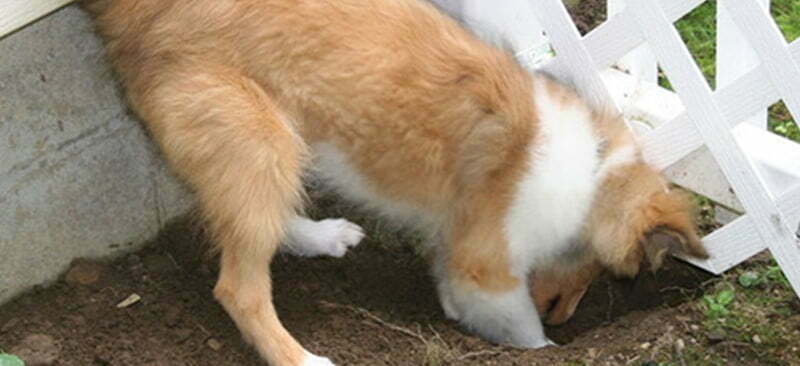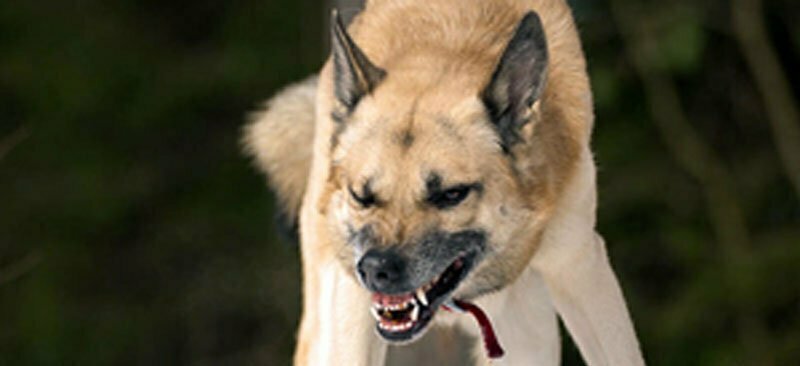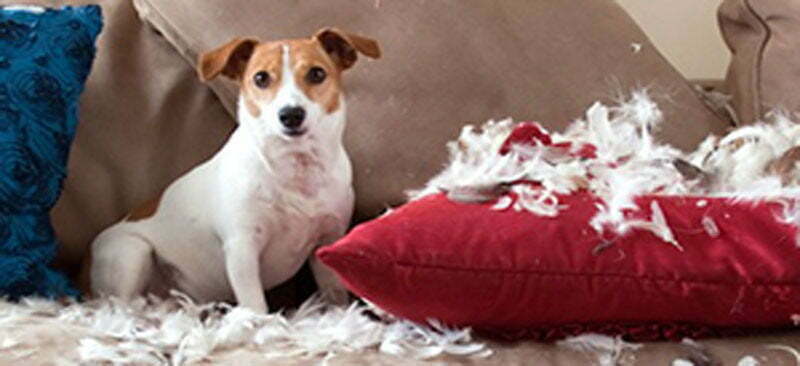Unwanted Behavior

Stop Destructive Chewing
Dogs use their senses to explore the world. To gather information they use vision, sense of smell and their favorite, putting things in their mouth. Puppies teethe for roughly six months.

Stop Nuisance Barking
No amount of training can teach a dog NOT to bark, but teaching a command to STOP is possible. Your dog barks for a reason. It’s up to us to find out why and train your dog to stop barking.

Stop Digging
There goes the lawn! Holes are everywhere! Is your dog trying to run away when he is digging under the fence? Is it a form of entertainment? Digging is triggered by a number of reasons.

Aggression
Growling as a way of communicating can be the first indication of aggression. It is a warning that a dog might bite. Your dog is telling you that he is uncomfortable or wants to possess or command.

Separation Anxiety
Why do some dogs have it and others don’t is not fully understood. What is known is that it is causing your dog to exhibit behaviors that are part of a panic response.

Fear Anxiety
Noises from thunderstorms, fireworks, construction sites, even vacuum cleaners and social situations involving other humans or animals can cause fear anxieties.
Stop Destructive Chewing
To soothe their ache they resort to chewing to ease the discomfort as it makes their sore gums feel better. Adult dogs with destructive chewing habits have reasons for doing this. It is up to us to figure out why they are doing it so that the bad behavior can be dealt with– and no, your dog is not getting back at you by being spiteful. Some reasons why they may be chewing include:
- They are mineral deficient.
- They’re bored.
- As a puppy they weren’t taught what they could and could not chew.
- They suffer from separation anxiety.
- Their behavior is fear-related.
- They just simply want attention, good or bad.
Please Note: You may need to consult your veterinarian for help with separation anxiety if the level is so high that your dog is hurting himself. Consider taking in a calm, low-key dog to help the one you already have or seek out a dog walker who can visit while you are at work. Sometimes a dog will just out grow that behavior. You may have to wait a year or longer though.
Stop Nuisance Barking
When visitors approach your home your dog will bark to let you know. By barking your dog is also letting the visitor know to refrain from getting any closer. Your dog is protecting his territory. That type of barking is called Territorial Barking. A bad guy is not going to risk your dog nipping or biting him and leaving him bloody or mangled; it’s just easier to go to rob your neighbor house who doesn’t have a dog. Sometimes they like to hear themselves speak because they are bored. If you have been lacking in exercise and training, time to step up get back on track. Sign up for a training class; put your dog in daycare a few days a week. Your dog’s mental and physical needs must be considered; if he is bored, find a way for him to keep busy. Barking to demand your attention usually starts when you are housebreaking your puppy. He barks to go out and then realizes he has your attention when he demands it; so he now he barks for everything. Separation Anxiety brings on nuisance barking. Your dog has to be okay while you are not there. Exercise is one way you can combat that destructive behavior.
Stop Digging
Just as in any other bad behavior your first course of action is to find out what reason it is. Once that is known then the problem can be solved. Dogs may dig for entertainment. Dogs often dig in an effort to catch burrowing animals or insects who live in your yard. When hot outside, a dog may dig a hole to lie in the cool dirt. They may also dig to provide themselves with shelter from cold, wind or rain or to find water. Attention-getting behavior is when a dog learns that they receive any for of attention, good or bad for engaging in it. Remember, even punishment is attention. Your dog may be looking for attention. Dogs may try to escape to get to something, to get somewhere or to get away from something.
Aggression
Your dog may growl because he is unhappy, fearful, shy or is in pain. Reactivity can occur as a result of a prior bad experience, poor socialization, or insufficient guidance. Changing your dog’s behavior will increase his self-confidence and create a well-balanced dog accustomed to a human lifestyle. Addressing aggression in the end will save your dog’s life. Only a professional should attempt to work with a dog with aggression as it is extremely dangerous work.
Separation Anxiety
They are eager for you to get home! These are some of the scenarios that can trigger separation anxiety:
- 1st time left alone.
- Being left alone when accustomed to constant human contact.
- Suffering a traumatic event, such as time at a shelter or boarding kennel.
- Change in the family’s routine or structure, or the loss of a family member or other pet.
Fear Anxiety
Could be genetic disposition. Some breeds are more prone to fear anxiety than others. The anxiety could be caused by an undiscovered medical issue. Puppies who have been deprived of key social and environmental experiences during the first few months of life can become habitually fearful. Pups taken away from their mothers before eight weeks can develop social anxiety. Dogs can develop fears at any time, though most develop fear between 1-3 years old. Abandonment, abuse and mistreatment are also causes.
